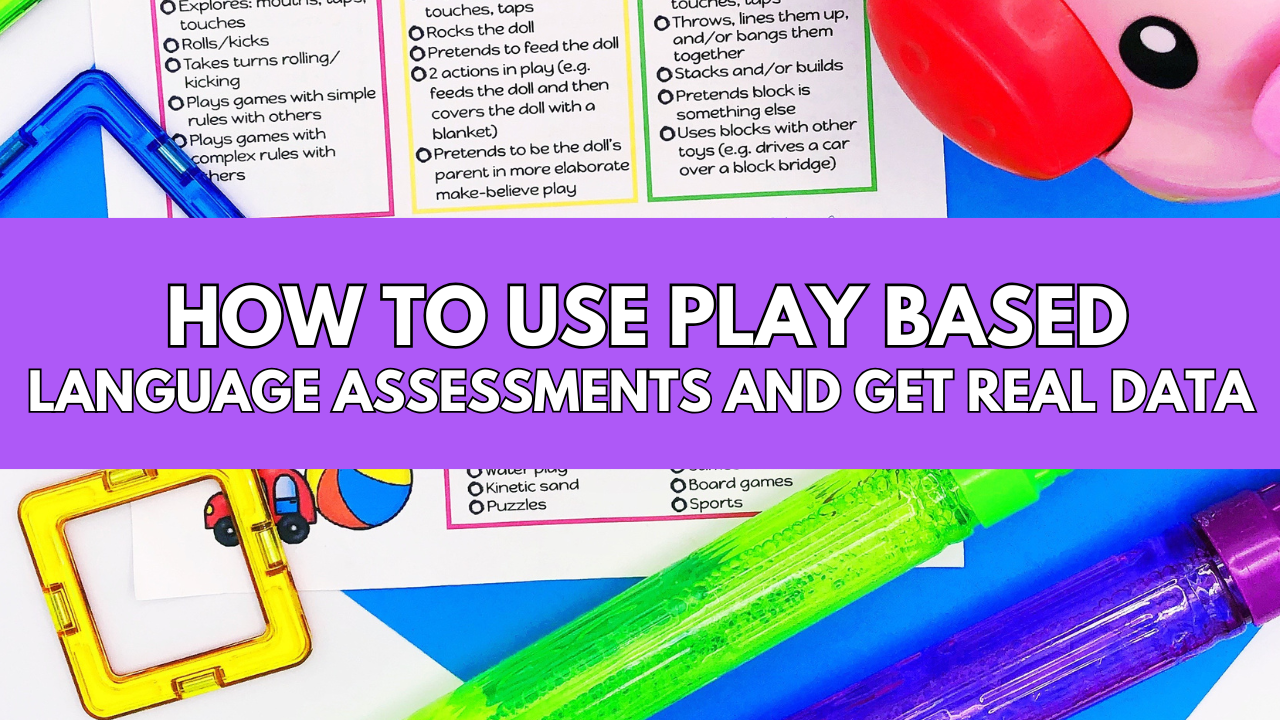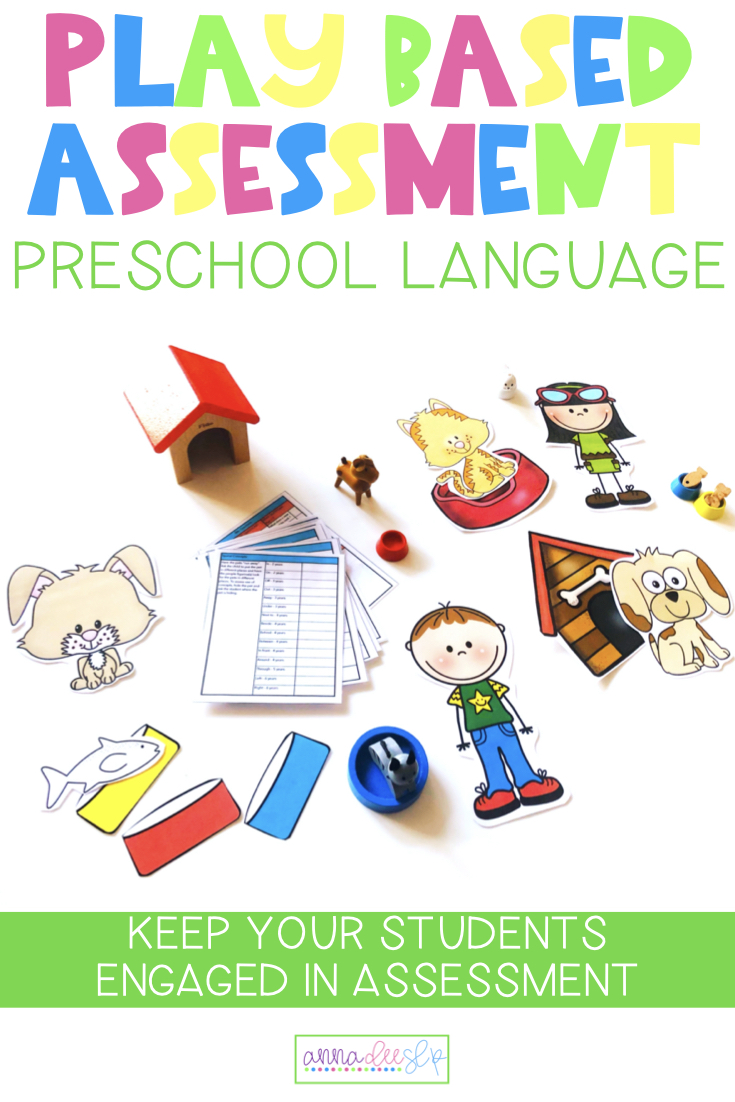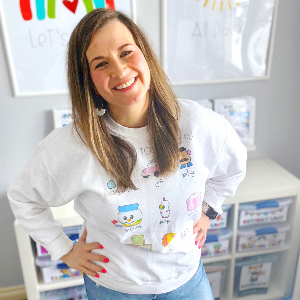How to Use Play-Based Language Assessments to Get Real Data From Preschoolers

Play-Based Language Assessment for Preschoolers: Why It Works (and How to Do It Well)
If you’ve ever tried to complete a formal language assessment with a preschooler who’s done by page two, you know exactly why play-based assessments are essential. Our youngest learners communicate best when they’re engaged, curious, and having fun — and that’s where play-based language screeners shine.
In this post, we’ll walk through how to use play as a natural and effective assessment tool that gives you authentic, reliable data (without the meltdowns, test fatigue, or endless reinstructions).
What Is a Play-Based Language Assessment?
A play-based assessment is an informal, criterion-referenced approach that lets speech-language pathologists (SLPs) evaluate a child’s expressive and receptive language skills during natural play. Instead of relying on structured prompts or rigid test questions, the SLP observes how the child communicates spontaneously — with real toys, real themes, and real joy.
This method is especially useful for preschool speech therapy, early intervention, and mixed-ability groups where traditional assessments may not capture a child’s true abilities.
Start With Purpose, Not Protocol
Before pulling out a single toy, clarify what you want to learn about the child’s communication. Are you looking for vocabulary diversity? Sentence structure? Turn-taking? Play-based assessments work best when guided by a clear focus.
These aren’t random play sessions — they’re intentional opportunities to observe language in context. A simple checklist of target areas (like those in the Informal Play-Based Language Assessment Screener) helps you stay organized while keeping the session fluid and responsive.
Choose Themes That Match the Child’s World
Children communicate most naturally when they’re playing within familiar, motivating themes — like pets, food, or farm play. That’s why the Informal Play-Based Language Assessment Screener uses a pet theme: it’s instantly engaging and provides endless opportunities for targeting verbs, spatial concepts, WH-questions, and sentence expansion.
 Play within everyday contexts makes it easier for kids to demonstrate what they can do — and helps you see the functional communication that formal tests can miss.
Play within everyday contexts makes it easier for kids to demonstrate what they can do — and helps you see the functional communication that formal tests can miss.
Observe, Don’t Over-Prompt
Play-based assessment is about stepping back to see what the child does independently. You’ll get a clearer picture of their spontaneous communication — not just their prompted responses.
Instead of saying, “What’s that?” for every toy, narrate naturally:
“You found the dog’s bone! What will he do with it?”
Then pause. Their response tells you so much more than a checklist ever could.
Collect Data the Easy Way
Forget juggling bulky test kits or manuals. Use a criterion-referenced format that lists target skills and age expectations side by side. Simply circle or jot notes as you go. This low-stress format keeps you present and observant — and it’s perfect for documenting progress over time or sharing with caregivers.
Tip: Use color-coded sticky notes or icons to mark expressive, receptive, and pragmatic language behaviors.
Keep It Playful — for You and the Child
When assessment feels like play, everyone wins. The child is relaxed, and you get high-quality, authentic language samples without the stress.
Try rotating play scenes every 5–10 minutes (e.g., vet clinic 🐶 → pet shop 🐾 → park outing 🌳) to keep engagement high. Each mini-scenario opens new opportunities for vocabulary, grammar, and social communication sampling.
Use Results to Drive Therapy Planning
Once you’ve finished, look for patterns across play scenes:
-
Do they combine 2–3 words consistently?
-
Are pronouns or prepositions missing?
-
Do they respond to WH-questions or just repeat?
Translate those observations into measurable, functional goals. For example:
“Given familiar toys, the child will use two-word phrases to describe actions in play (e.g., ‘dog run’) with 80% accuracy.”
A Quick Note About Scope of Practice
Play-based assessments should always be administered and interpreted by licensed SLPs. Parents and educators can absolutely support communication growth through play, but formal or informal assessments belong within professional practice.
If you’re an SLP looking for a ready-made tool, check out the Informal Play-Based Language Assessment Screener for Preschool Speech Therapy on TPT — designed for smooth, fast, and genuinely fun assessment sessions.
FAQ: Play-Based Language Assessment in Speech Therapy
Q: What makes play-based assessments different from standardized tests?
Standardized tests rely on fixed prompts and scores, while play-based assessments use natural, interactive play to see how a child communicates in real-life situations. You’ll capture authentic expressive and receptive language skills — not just what a child can do on command.
Q: Are play-based assessments valid for goal-setting?
Yes! They’re excellent for identifying communication strengths, emerging skills, and next steps. The data may be qualitative, but it’s incredibly valuable for writing functional, measurable therapy goals.
Q: What materials do I need for a play-based assessment?
Keep it simple: use motivating, open-ended toys like animals, vehicles, play food, dolls, or pretend-play sets. The goal is engagement, not fancy materials.
Q: Can parents or teachers use this screener?
The Informal Play-Based Language Assessment Screener should be administered by an SLP, but parents and educators can use the same themes and play ideas to encourage communication at home or in the classroom.
Q: What age group is this assessment designed for?
It’s ideal for preschool-aged children (ages 3–5) who benefit from hands-on, play-based approaches to communication and learning.
Why Play-Based Assessment Matters
When you shift from traditional tests to play-based language assessments, you gain something priceless — real communication in real moments. You’ll see how children use language to problem-solve, share ideas, and connect — the heart of what we do as SLPs.
Ready to make your next assessment smoother, faster, and more fun?
👉 Explore the Informal Play-Based Language Assessment Screener for Preschool Speech Therapy on Teachers Pay Teachers.
Let's stay connected!
Join the mailing list to receive updates with new freebies, promos, and specials!
Don't worry, your information will not be shared.
We hate SPAM. We will never sell your information, for any reason.


